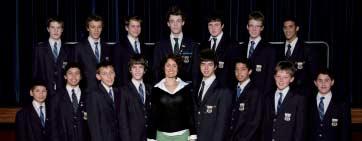Science Academic
S
cience went digital at Trinity in 2007 – or we at least began a transformation in our approach to integrating technology into the curriculum. Thanks to a very generous grant from the College, the Physics Learning Area was able to purchase a Mr Tim Blake significant amount of Pasco Head of Science data logging equipment under the direction of our senior Physics teacher Mr Craig Adams, assisted by Mr Mark Dodd and Mr Bill Cooper. The ability to measure and record data continuously with state-of-the-art technology will not only open up a whole new dimension of investigation for the students, but also mirror the type of research conducted in industry. In 2008, the program will expand to include the other Senior School and Middle School subjects. It should be recognised that the management of the new resources and the ease of integration into the curriculum would not be possible without an enormous amount of sound advice and hard work by our laboratory technicians Mr Lim May San and Ms Debra Renfrey. Our students once again excelled in the 2006 TEE results with Trinity being in the top ten schools in the state in Human Biology, accolades go to science teacher Ms Brigitte Savy-Walsh. Despite our excellent TEE results over the last five years, far too few of our boys opt to study the life sciences and many struggle with the physical sciences in the mistaken belief they will get a better TER score. Biology and Human Biology are subjects offering wide ranging applications and life skills and more students would be well advised to take them up, especially if they wish to specialise in related fields. Stephen Dale (12.4) has been an exceptional ambassador for Trinity over the past twelve months. Our Year 12 Chemistry Prize winner was selected to go to Canberra along with only nineteen other students for the 2006 Australian Olympiad Summer School. After completing the course Stephen narrowly missed out on qualifying for the National team that travels overseas to compete in the world championships. However such was his success that he was approached by the Asian Science Camp. This prestigious International program for school students
is by invitation only catering to the best science talent in the world. Stephen had the most marvellous time representing Australia at the event under the tutelage of thirteen world renowned professors, five of whom are Nobel Prize winners. Stephen has again been selected for the 2008 Olympiad summer school but has decided to study at university instead. We are very proud of our first academic Olympian and wish him all the best in what will be a great future. Well done Stephen. With the help of science teacher Mr Mike Slack-Smith, the new co-curricular Student Information Program (SIPS) was trialled for Year 10 students, introducing them to career opportunities in the oil industry. A dozen lucky students were treated to a series of lectures by oil professionals from Woodside Petroleum Limited about the various fields open to them. It is possible that the boys will never forget the 3-D room at Woodside where a hologram of the North West Shelf oil reservoirs appeared to float around their heads. During 2007, we once again had excellent results in various science competitions, particularly The Rio Tinto Big Science Competition, and the Royal Australian Chemistry Institute (RACI) Australia National Chemistry Quiz reaped excellent results; testament to the quality of tuition by science teachers Mr Al Hay and Mr Jim Shackleton. Biology continued to lead the way in co-curricular activities with trips to Malaysia, Dryandra and the Stirling Ranges, as well as various ecosystems in the Perth area. Teachers Ms Brigitte Savy-Walsh and Mr Bobby Emmanuel conducted the annual trip to Perth Zoo to study our closest primate relatives. With much uncertainty and unease surrounding the proposed new Courses of Study for Senior School, 2007 continued to provide challenges. It has been a difficult birth for the new courses and much hard work lies ahead prior to their introduction in 2009. However, the professionalism of the staff in the Science Learning Area (SLA) will ensure that the high standard of teaching and the rigorous science education at Trinity will not diminish. I would like to thank all the SLA staff for their hard work and professionalism throughout the year. Mr Tim Blake Head of Science
169





















































